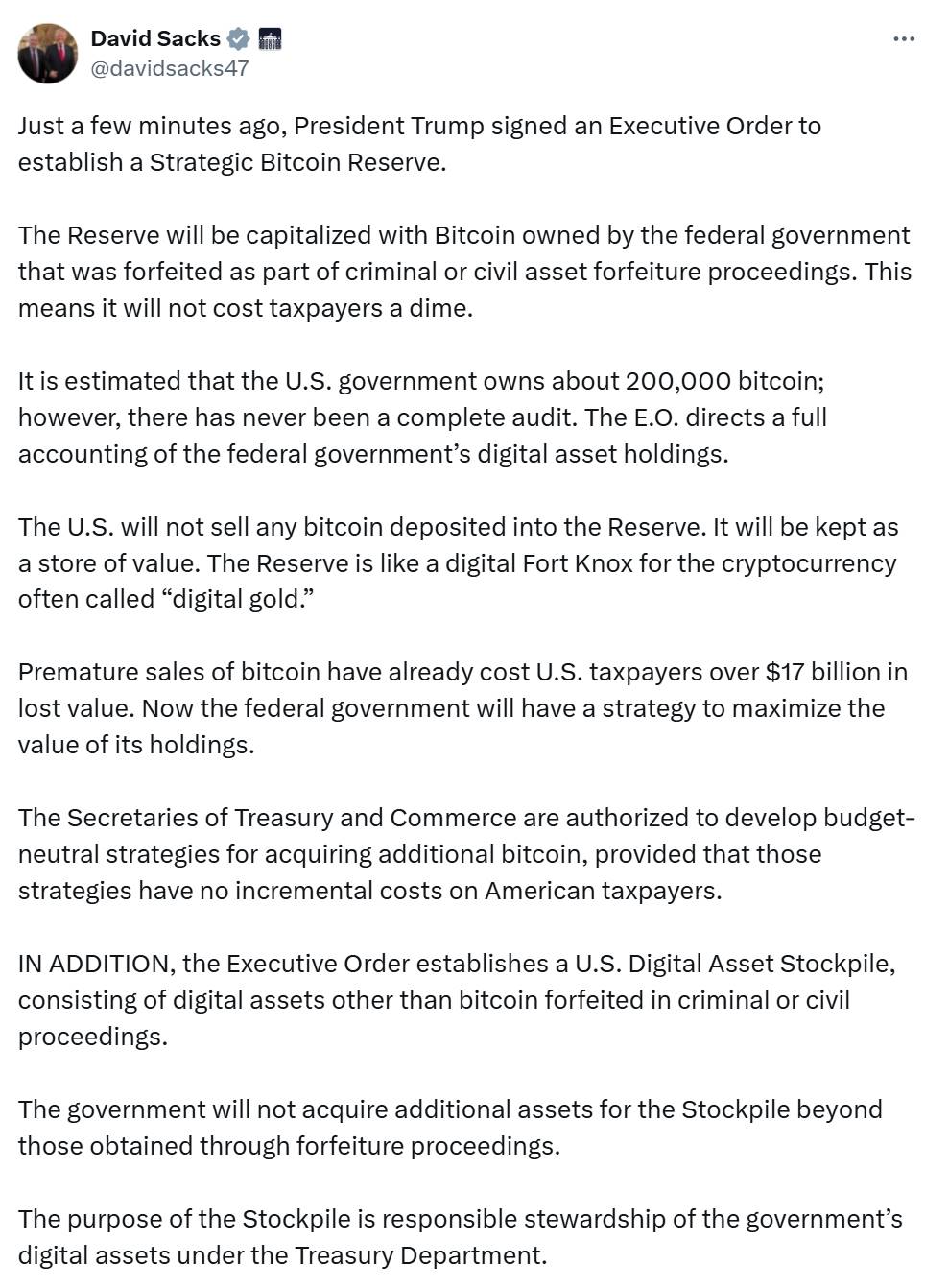The reserve will rely on existing confiscated assets, will not involve taxpayer funds, will be positioned as a value storage tool, and will clearly not be sold.
Written by: 1912212.eth, Foresight News
On March 7, Trump signed a highly anticipated executive order, officially announcing the establishment of the United States "Strategic Bitcoin Reserve" (SBR). This move fulfills part of his campaign promises, aiming to incorporate Bitcoin into the national financial strategy. Additionally, the executive order establishes a U.S. digital asset reserve, which includes digital assets confiscated in criminal or civil proceedings, with the Treasury Secretary determining responsible management strategies, including the potential sale of the U.S. digital asset inventory. (Bitcoin can be purchased, provided that these strategies do not impose additional costs on U.S. taxpayers.)
However, a subsequent remark by David Sacks, the White House's head of AI and crypto affairs, sparked intense market and public reactions: "Apart from Bitcoin obtained through criminal or civil asset forfeiture procedures, the government will not acquire additional assets for this altcoin digital asset inventory." Just days earlier, Farcaster co-founder Dan Romero tweeted a prediction about the crypto asset reserve: the government would only retain seized assets and would not make new purchases. This has now proven to be accurate.

Following this statement, market prices fluctuated, with BTC dropping from $91,000 to around $84,000 around 8 AM this morning, before rebounding to approximately $87,000, resulting in a 4.9% price fluctuation within one hour.
Is this a milestone in cryptocurrency history, or a scaled-back version of Trump's crypto presidential promises?
From Campaign Promises to Policy Implementation
As early as his 2024 campaign, Trump frequently expressed support for the cryptocurrency industry, promising to make the U.S. a global cryptocurrency hub. At the Nashville Bitcoin Conference, he stated that if elected, he would retain the Bitcoin held by the government and establish a strategic reserve to counter potential risks to the dollar and promote financial innovation. At that time, the U.S. government had confiscated approximately 200,000 Bitcoins through crackdowns on illegal activities (such as dark web transactions and Ponzi schemes), estimated to be worth over $20 billion at current prices. These assets became the foundation for Trump's envisioned reserve and were seen as a zero-cost starting point for his policy implementation.
The signing of this executive order has turned this vision into reality. However, the reserve will rely on existing confiscated assets, will not involve taxpayer funds, will be positioned as a value storage tool, and will clearly not be sold. This stands in stark contrast to Trump's previous bold claims that "Bitcoin will surpass gold," raising questions about the specific execution strength of his policies.
Market Reaction
After the executive order was announced, some expressed disappointment while others remained optimistic. Disappointed individuals stated that the executive order did not provide any substantial benefits. In contrast, market optimism still dominated.
Coinbase Chief Analyst David Duong analyzed that "for those dissatisfied with the U.S. government not continuing to accumulate Bitcoin, this actually misses the point entirely. This is very positive in the long run. Future capital inflows will come from long-term institutional investors who have greater confidence in Bitcoin as a global, supranational asset."
Bitwise Chief Investment Officer Matt Hougan stated that the impact of the U.S. Strategic Bitcoin Reserve will:
1) Significantly reduce the likelihood of the U.S. government "banning" Bitcoin in the future;
2) Significantly increase the likelihood of other countries establishing strategic Bitcoin reserves;
3) Accelerate the process of other countries considering the establishment of strategic Bitcoin reserves, as this creates a short-term window for other countries to act ahead of potential U.S. accumulation;
4) Make it more difficult for various institutions—from national wealth management platforms to quasi-governmental organizations like the International Monetary Fund (IMF)—to describe Bitcoin as a dangerous or unsuitable asset for holding.
Symbolically, this move is undoubtedly an important milestone in the history of Bitcoin's development. As the first U.S. president to explicitly incorporate Bitcoin into national strategy, Trump's actions may further promote the legitimization and mainstream acceptance of cryptocurrencies.
As Sacks stated, this indicates that Bitcoin is transitioning from a fringe asset to a national-level value storage tool, with a vision that seems no longer distant, alongside gold and foreign exchange reserves. Additionally, this may inspire more countries to follow suit—countries like Brazil and Poland have already proposed similar reserve plans.
However, the decision not to acquire additional assets also exposes the limitations of the policy. In contrast, if the U.S. were to purchase more Bitcoin using fiscal funds, it could not only directly boost prices but also take the initiative in the global reserve race.
Now, relying solely on confiscated assets limits the scale of the reserve and prevents active investment from influencing market trends. Analysts point out that this may reflect a compromise by the Trump administration under fiscal pressure and internal opposition. After all, a comprehensive purchasing plan would require Congressional approval, and the Republican Party's stance on cryptocurrencies is not monolithic.
Future Outlook
Globally, Bitcoin reserves are becoming an emerging trend. Brazil plans to use it as an anti-inflation tool, while Poland views it as a means of economic diversification. In contrast, while the U.S. move is groundbreaking, it appears conservative due to the "zero addition" policy.
The executive order signed by Trump regarding the Bitcoin strategic reserve is both a symbolic step towards incorporating cryptocurrency into national strategy and a source of controversy due to the limitations on additional acquisitions. In the short term, the Bitcoin market may face pressure due to unmet expectations; in the long term, the symbolic significance of this reserve may reshape the global financial landscape. However, whether its scale and influence can match Trump's grandiose rhetoric remains to be seen. What will be the next steps for the Bitcoin strategic reserve? Perhaps only time will reveal the answers through subsequent policy details and market feedback.
免责声明:本文章仅代表作者个人观点,不代表本平台的立场和观点。本文章仅供信息分享,不构成对任何人的任何投资建议。用户与作者之间的任何争议,与本平台无关。如网页中刊载的文章或图片涉及侵权,请提供相关的权利证明和身份证明发送邮件到support@aicoin.com,本平台相关工作人员将会进行核查。




